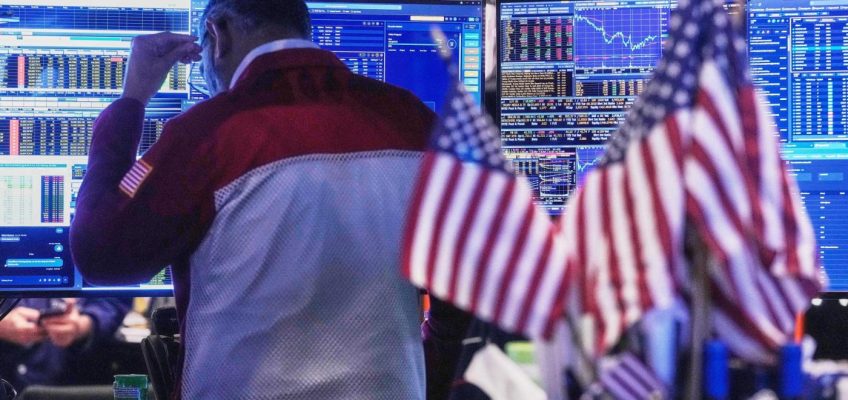By TERESA CEROJANO and MATT OTT, Associated Press
Wall Street surged on Thursday after Nvidia reported stronger than expected quarterly earnings, tempering worries that AI-related stocks may have become overvalued.
Related Articles
U.S. employers added surprisingly solid 119,000 jobs in September, government says in delayed report
Advocacy groups urge parents to avoid AI toys this holiday season
Walmart raises profit expectations as more Americans hunt deals in sluggish economy
As infant botulism cases climb to 31, recalled ByHeart baby formula is still on some store shelves
Fed minutes: Most officials supported more rate cuts but not necessarily in December
Futures for the S&P 500 were up 1.1% before the opening bell, while futures for the Dow Jones Industrial Average gained 0.5%. Futures for the Nasdaq shot 1.6% higher.
The market’s focus remained on Nvidia as Wall Street’s most influential stock jumped 5.1% overnight after the chipmaker reported third-quarter earnings of $31.9 billion. That’s a 65% increase over last year and more than analysts were expecting.
The Santa Clara, California company also forecast revenue for the current quarter covering November-January will come in at about $65 billion, nearly $3 billion above analysts’ projections, an indication that demand for its AI chips remains feverish.
Nvidia is the most valuable company by market capitalization on Wall Street, having briefly topped $5 trillion in value. That means its movements have more of an effect on the S&P 500 than any other stock, and it can single-handedly steer the index’s direction some days.
By continuing to deliver big profits for investors, Nvidia has mostly quieted recent criticism that its shares shot too high, too fast.
Nvidia has become a bellwether for the broader frenzy around artificial-intelligence technology, because other companies are using its chips to ramp up their AI efforts.
Walmart also reported its latest quarterly results Thursday. The Arkansas retailer delivered another standout quarter, posting strong sales and profits that blew past Wall Street expectations as it continues to lure cash-strapped Americans who have grown increasingly anxious about the economy and prices.
With other retailers dialing back projections, the nation’s largest retailer raised its financial outlook Thursday after its strong third quarter, setting itself up for a strong holiday shopping season.
Traders also made their final moves ahead of a September jobs report coming from the U.S. government on Thursday. The labor market data, usually released during the first week of every month, was delayed due to the six-week federal government shutdown.
The Labor Department said Wednesday that it will not be releasing a full jobs report for October because the 43-day shutdown meant it couldn’t calculate the unemployment rate and some other key numbers.
The job market has been slowing enough this year that the Fed has already cut its main interest rate twice. Lower rates can give a boost to the economy and to prices for investments, and the expectation on Wall Street had been for more cuts, including at the Fed’s next meeting in December.
But some Fed officials are hinting that they should pause next month, in part because inflation has stubbornly remained above the Fed’s 2% target. Lower interest rates can worsen inflation.
At midday in Europe, Germany’s DAX rose 0.8%, while Britain’s FTSE 100 and the CAC 40 in Paris each added 0.6%.
In Asia, Japan’s Nikkei 225 index initially surged as much as 4.2% before giving up some early gains. It closed nearly 2.7% higher at 49,823.94 as technology stocks rallied, with investor sentiment boosted by Nvidia’s strong quarterly results after trading closed in the U.S.
South Korea’s Kospi added 1.9% to 4,004.85, with gains led by technology and energy stocks. Investors were encouraged by Nvidia’s earnings and reports that the U.S. may delay planned semiconductor tariffs.
Samsung Electronics gained 4.2%, while SK Hynix added 1.6%.
Chinese markets ended mixed as reports said the government might be planning more measures to try to revive the ailing property sector.
Hong Kong’s Hang Seng Index was barely changed at 25,835.57, while the Shanghai Composite index lost 0.4% to 3,931.05 after China’s central bank kept its one- and five-year loan prime rates unchanged at 3% and 3.5%, respectively.
Taiwan’s Taiex closed 3.2% higher while India’s BSE Sensex added nearly 0.7%.
Australia’s S&P/ASX 200 gained 1.2% to 8,552.70, also led by gains for technology stocks.
In energy markets, benchmark U.S. crude oil gained 59 cents, or 1%, to $59.61 per barrel. Brent crude, the international standard, rose 62 cents to $64.13 per barrel.
The U.S. dollar climbed to 157.66 Japanese yen from 157.06 yen. It has been trading at nearly the highest level this year on expectations that the government will delay efforts to rein in Japan’s national debt as Prime Minister Sanae Takaichi raises spending to help spur the economy.
The euro fell to $1.1515 from $1.1538.


Leave a Reply